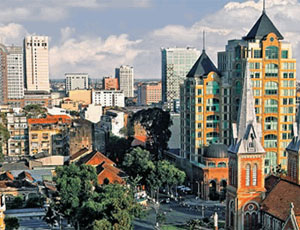Vietnam’s Property Market Expected to Recover
 HCMC – Industry experts predict that Vietnam’s property market will soon bottom out and then gradually improve on the back of increased liquidity in the low to medium-end housing sector.
HCMC – Industry experts predict that Vietnam’s property market will soon bottom out and then gradually improve on the back of increased liquidity in the low to medium-end housing sector.
Vietnam’s property market suffered from liquidity problems in the past few years, due in part to a mismatch between the supply and demand sides. While the majority of properties on the market are over 70 square meters, and aimed at the higher end of the property market, there has been an increasingly strong appetite for property at the low to medium-cost end. To meet this demand, developers have sought to reduce the size of their apartments, and their efforts have changed the structure of the property market.
 RELATED: Dezan Shira & Associates’ Business Advisory Services
RELATED: Dezan Shira & Associates’ Business Advisory Services
Activity in the low to medium-end of the housing sector has increased significantly over the past year, and has injected a much-needed dose of liquidity into the property market.
Last year, the value of property inventories fell to nearly US$4.5 billion, representing a 26.5 percent drop from the first quarter to the last, largely as a result of the liquidation of small and medium houses and apartments in large cities. Trinh Dinh Dung, Minister of Construction, explained that property prices dropped between 10 to 30 percent last year, which boosted sales and reduced market supply.
Liquidity in this sector is expected to continue improving, as global real estate firm Savills reported that the number of transactions saw a 45 percent year-on-year increase in 2013.
Legal reform relating to foreign ownership of properties could also play a large role in the recovery of the property market. Reforms making it easier for foreigners to purchase residential property in Vietnam are expected to stimulate the domestic real estate market, particularly at the higher end of the market. Around 80,000 foreigners are estimated to be living and working in Vietnam according to the Ministry of Labour, Invalids and Social Affairs, though fewer than 500 owned homes there as of February 2013.
RELATED: Housing for Foreigners in Vietnam
At present, foreigners in Vietnam still face numerous restrictions on their ability to purchase residential real estate. Prime Minister Nguyen Tan Dung is pushing proposals to relax those restrictions, including allowing foreigners to buy more than one property, to lease out property to tenants, to purchase townhouses and villas of up to 500 square meters and extending the current leasehold ownership limit of 50 years.
Experts have observed that although the local property market has not fully recovered, it holds great potential for foreign investors as the housing demand is high, urbanization is slow, and population is young. At the same time, many domestic investors lack the capital to invest in development projects.
Despite what looks to be a prime opportunity for investment, foreigners have thus far been slow to commit to real estate projects. The Ministry of Planning and Investment’s Foreign Investment Agency reported that FDI in the real estate sector amounted to US$951 million across 25 projects in 2013, a figure which is a far cry from the US$1.97 billion invested in 2012.
RELATED: Vietnam Looks to Relax Foreign Property Ownership Laws
The government is expected to soon introduce changes allowing foreign-invested enterprises to hold land use rights to develop residential housing, which may help FDI in the real estate sector recover to its previous levels.
You can stay up to date with the latest business and investment trends across Vietnam by subscribing to Asia Briefing’s complimentary update service featuring news, commentary, guides, and multimedia resources.
Related Reading
Cities Across China Tighten Control Over Real Estate Market
Real Estate Market Trends in Hanoi
Sustainability of Vietnam’s Real Estate Market
Mumbai’s Commercial Real Estate Market
- Previous Article FDI in Dong Nai Soars
- Next Article Sky-High Competition: Vietnam’s Budget Airlines









